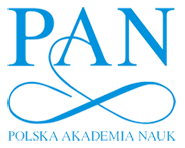Plenarne posiedzenie Komitetu Genetyki Człowieka i Patologii Molekularnej PAN, 11 marca 2024 r., Pałac Kultury i Nauki
- Details
Wydział V Nauk Medycznych Polskiej Akademii Nauk uprzejmie zaprasza na pierwsze organizacyjne zebranie plenarne Komitetu Genetyki Człowieka i Patologii Molekularnej PAN, które odbędzie się w dniu 11 marca 2024 r. o godz. 11.00 w sali 2603 Pałacu Kultury u Nauki w Warszawie.
Program spotkania:
1) Wybór Przewodniczącego - elekta Komitetu
2) Wybór Zastępcy lub dwóch zastępców Komitetu
3) Wybór Prezydium Komitetu
4) Ustalenie struktury Komitetu
5) Sprawy bieżące i wolne wnioski.
Ze względu na konieczność uzyskania kworum, niezbędnego dla ukonstytuowania się Komitetu, bardzo prosimy o niezawodny udział w posiedzeniu.
Koszty podróży będę rozliczane na podstawie wypełnionego druku delegacji oraz załączonych biletów.
Prof. dr hab. Marek Krawczyk
Dziekan Wydziału V Nauk Medycznych
Plenarne posiedzenie Komitetu Genetyki Człowieka i Patologii Molekularnej PAN, 5 grudnia 2023 r., Poznań, IGC PAN
- Details
Plenarne posiedzenie Komitetu odbyło się w dniu 5.12.2023 r. w formie hybrydowej w Poznaniu w Instytucie Genetyki Człowieka PAN i on-line. Posiedzeniu przewodniczył prof. dr hab. Michał Witt. Przedstawiono dwa wykłady. Prof. dr hab. n. med. Maciej Wiznerowicz, UMP przedstawił badania nad nowotworami - Stemness as Hallmark of Cancer. Dr hab. n. med. Paweł Gawliński, prof. IMiD omówił działalność naukową Komitetu Antynoblowskiego w latach 1991-2023.
Plenarne posiedzenie Komitetu Genetyki Człowieka i Patologii Molekularnej PAN, 20 marca 2023 r., Warszawa, PKiN
- Details
Plenarne posiedzenie Komitetu Genetyki Człowieka i Patologii Molekularnej PAN odbyło się w dniu 20 marca 2023 r. w sali nr 2604 (XXVI piętro) w Pałacu Kultury i Nauki w Warszawie.
Program posiedzenia
1. Prof. dr hab. Ewa Ziętkiewicz (Instytut Genetyki Człowieka PAN) pobierz
Badania genomów wymarłych homininów i ewolucji człowieka; Svante Paabo – nagroda Nobla 2022 w dziedzinie fizjologii i medycyny.
2. Dr hab. Natalia Rozwadowska, prof. IGC (Instytut Genetyki Człowieka PAN)
Inicjatywa na rzecz odpowiedzialnych badań nad terapiami komórkowymi i komórkami macierzystymi.
3. Sprawy bieżące i wolne wnioski
Posiedzenie KGCiPM PAN, 20.03.2023, Warszawa
- Details
Plenarne posiedzenie Komitetu Genetyki Człowieka i Patologii Molekularnej PAN odbyło się w dniu 20 marca 2023 r. w siedzibie PAN w Pałacu Kultury i Nauki w Warszawie.
Podczas posiedzenie przedstawiono dwa wykłady:
1. Prof. dr hab. Ewa Ziętkiewicz (Instytut Genetyki Człowieka PAN)
Badania genomów wymarłych homininów i ewolucji człowieka; Svante Pääbo – nagroda Nobla 2022 w dziedzinie fizjologii i medycyny pobierz
2. Dr hab. Natalia Rozwadowska, prof. IGC (Instytut Genetyki Człowieka PAN)
Inicjatywa na rzecz odpowiedzialnych badań nad terapiami komórkowymi i komórkami macierzystymi.
3. Sprawy bieżące i wolne wnioski
Posiedzenie KGCiPM PAN, 6.06.2022
- Details
Plenarne posiedzenie Komitetu Genetyki Człowieka i Patologii Molekularnej PAN odbyło się w dniu 6 czerwca 2022 r. (poniedziałek) o godz. 11.00 w formie on-line.
Program posiedzenia
1. Prof. dr hab. Maria M. Sąsiadek (Uniwersytet Medyczny im. Piastów Śląskich we Wrocławiu)
Znaczenie badań genetycznych dla personalizowanej opieki nad pacjentami z dziedzicznymi zespołami zwiększonego ryzyka zachorowania na choroby nowotworowe oraz nad pacjentami z nowotworami sporadycznymi
2. prof. dr hab. Olga Haus (Collegium Medicum Uniwersytetu Mikołaja Kopernika w Bydgoszczy)
Badania genetyczne w hematoonkologii. Ćwierć wieku leczenia celowanego
3. Sprawy bieżące i wolne wnioski
Page 1 of 3



